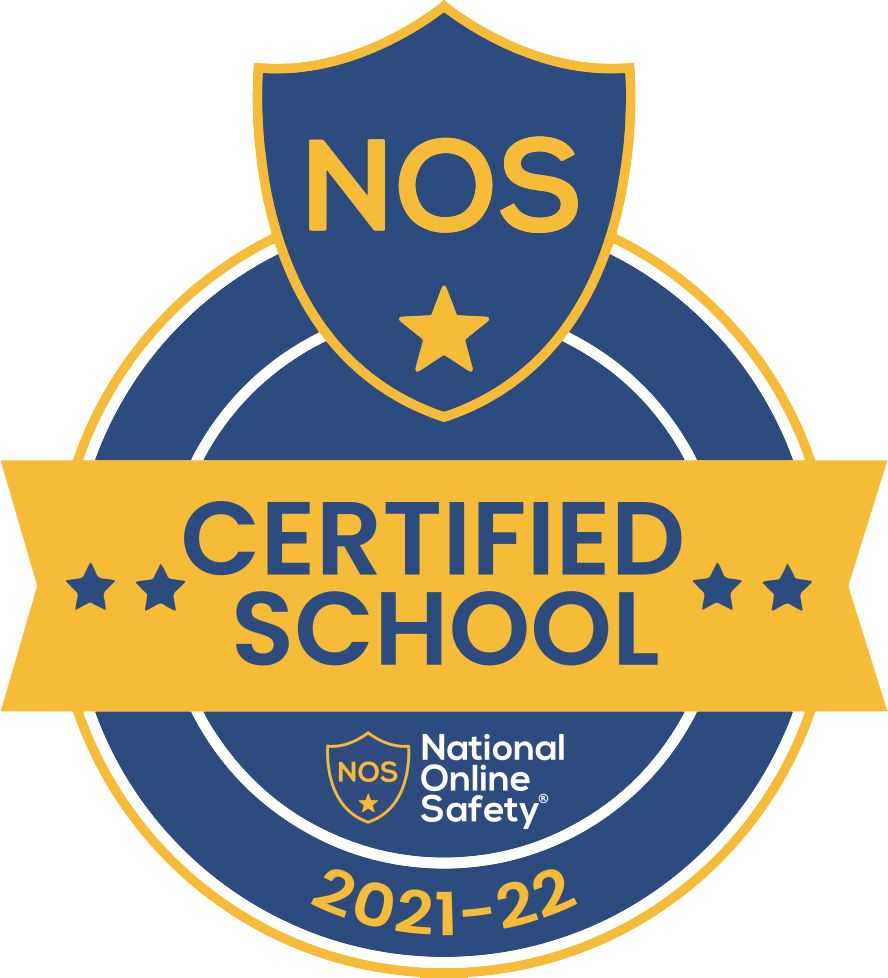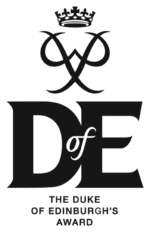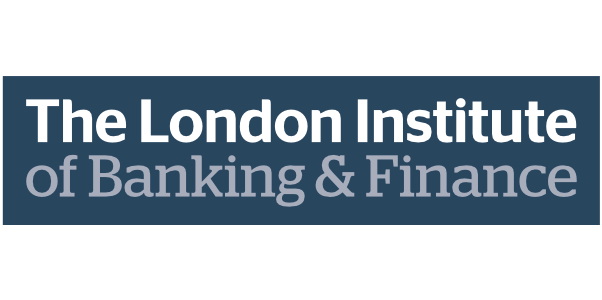Physical Education
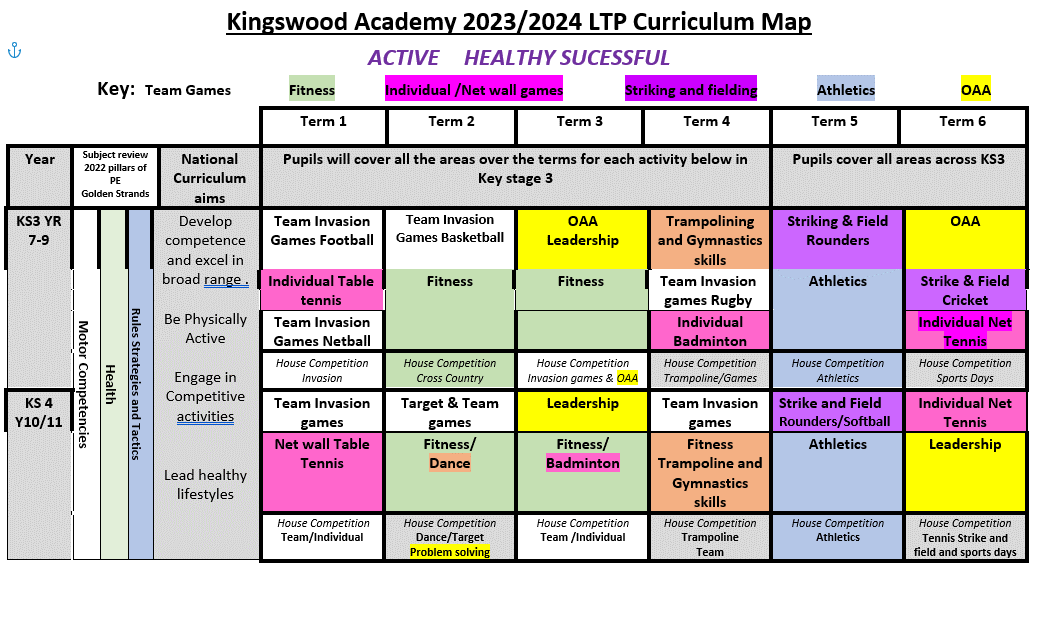 Physical Education Subject Intent Document
Physical Education Subject Intent Document
Pupils leave a GAT Academy with the academic qualifications & wider skills, characteristics & experiences, which will assist them to lead successful & happy lives
ACTIVE SUCCESSSFUL HEALTHY
ASH
Our Curriculum Intent at Kingswood:
To develop an aspirational, knowledge based and carefully sequenced curriculum that enables all learners to acquire and demonstrate deep knowledge through interconnected webs of ideas and concepts underpinned by knowledge and experience of vocabulary, cultural capital, SMSC and the KSA Core Competencies.
Physical Education subject Intent:
ACTIVE SUCCESSSFUL HEALTHY
Our intent is comprised of the following 3 sections:
- Our vision for the subject/faculty and the purpose it serves for our pupils
- Defining what the key concepts and core domains of knowledge are, that pupils will learn about
- The end points our curriculum is working towards
Active: For all pupils to be engaged, motivated and be physically involved as a performer, leader, official or member of a sports competition.
Successful: To instil core competencies and long-term success in physical society.
Healthy: To develop lifelong knowledge for healthy minds and bodies.
- Our vision
- Aspiration – We aim to provide opportunities for students to be performers, leaders and theorists in sport across a broad range of areas which lead to many pathways as adults. By entering many school games, county and local leagues we show pupils the varying levels they can aspire to meet or show them that they can realize their potential by taking up more opportunities. Visits to Loughborough University and Sports facilities like the KLV, ROCK UK allows pupils to realise the opportunities out there for them if they want to work hard. Ex pupils are used to model success and their success displayed in the facilities.
- Core knowledge – students are taught about a range or rules, skills and tactics in sport across core PE and through a range of individual and teams sports as well as athletics and gymnastics activities . The value of health and mental fitness is taught in explicit units as well as through a range of competitive formats in different sports. If pupils choose to study PE at keystage 4 they progress their knowledge of fitness, anatomy, sport psychology and the social aspects of sport though different courses.
- Skills – Pupils are taught the skills and techniques in a range of actives so they can find some that they will continue and so they are no put off by external barriers. We also believe that teaching pupils the rules and ways to lead will enable them to contribute to society in sport as community leaders, parents or performers.
- PE is the only subject that can teach people how to live longer and therefore physical, mental and social aspects of health are considered to be one of our most important knowledge areas. Pupils are therefore taught a variety of methods and activities to empower them to look after themselves at different stages in their future lives ie Cardio Vascular fitness for midlife spread, Muscular Endurance for older age and how to keep themselves healthy and physically able.
- Developing cultural capital –The school facilities and local setting can mean pupils are limited in their knowledge of sports and the opportunities that exist for them. The leadership academy allows them to identity their own strengths and build their skill set to be the future sports leaders in society. Extra-curricular fixtures and involvement in events like the school games builds pupils confidence and knowledge of the level of skills and opportunities that are in their local community and wider. Guest speakers in the roles of coaches, fitness instructor and sport therapists allow pupils to see what is available as employment in society. Sports Colours are awarded to pupils which builds pupils knowledge of how elite sports clubs work, and the commitment they require to be successful.
- Developing character – enabling our students to RISE. In particular developing our Core Values of:
- Respect- Sport requires the following of rules and respect to follow players, spectators and officials.
- Independence- The PE curriculum aims to develop independence in pupils by allowing them more time to make decisions, officiate and plan parts of lessons in order to manage their own wellbeing and activity.
- Service- Pupils are offered the opportunity to report their teams in intra/inter competitions, Sports day and to serve the school in local competitions.
- Empathy- Within PE we create many opportunities where empathy is very visual and thus good sportsmanship is enforced, modelled and developed through the competitions in lessons. Reflection times are regularly used as a tool for pupils to understand the consequences of their actions and leadership is used to develop the understanding in pupils that empathy is need when in positions of power.
- Identifying and addressing context specific need – We serve a deprived community where levels of child obesity are above average. This means that fitness education and sensitivity to body image issues is needed. Most lessons start with similar pulse raiser that ensures pupils warm up properly and thus become familiar with what a raised pulse feels like. We also include lessons on energy balance in fitness units and offer lots of extra curricular clubs to encourage the 60 mins of a day activity. At lunchtime pupils are provided with equipment to be active and managed by staff to ensure safety. Local clubs and opportunities are advertised as well as pupils being directed/taken to trials where possible.
.
- Learning is sequential – The PE core curriculum is sequenced to allow student’s performance, knowledge and understanding to grow and build on prior skills and knowledge. Students are taught sequential units of key activities to ensure that their skill levels develop and build, this helps pupils grow in confidence and avoids cognitive overload and demoralisation.
- In core PE we have explicit fitness knowledge and vocabulary that sets the platform for GCSE PE and CNAT sport. Within the GCSE/CNAT courses the units are planned so knowledge and understanding can be built upon and that there is time for retrieval tasks regularly. DNA’s are used
- to support the regularity of retrieval and support literacy needs in our catchment
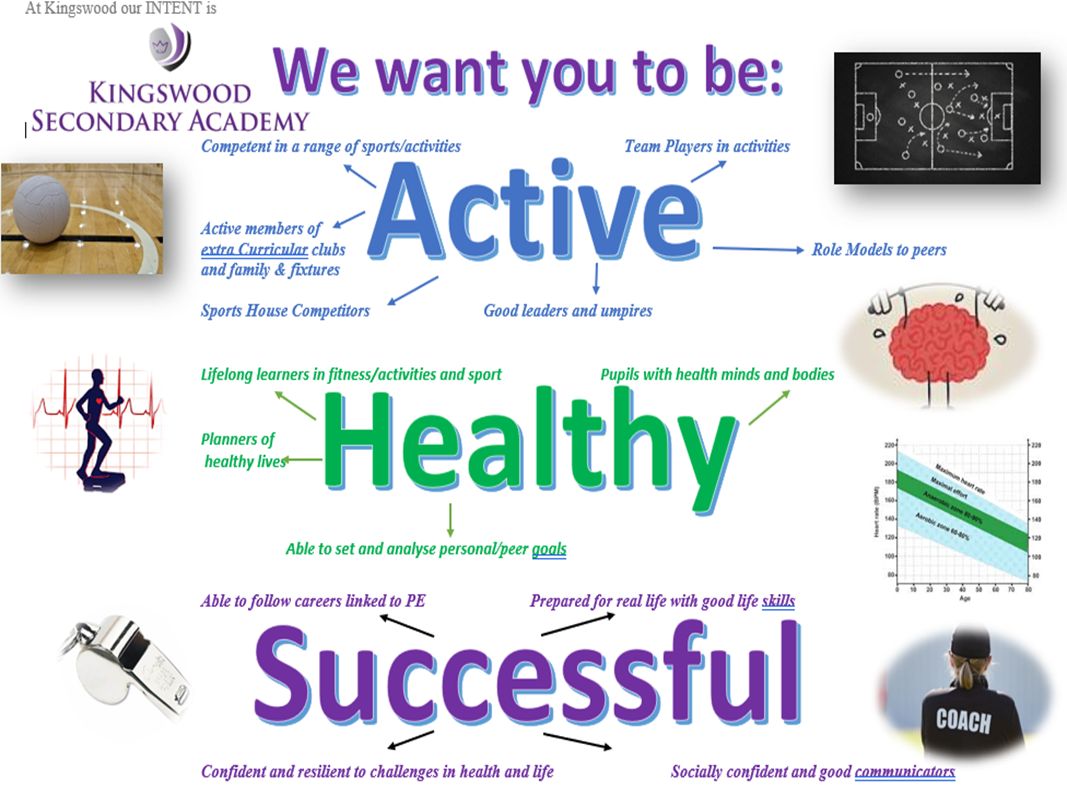
Curriculum End Points
Year 7;
Pupils will know and be able to show basic skills, techniques and rules for a range of Activities/Team/Individual games: including:
- Football, Basketball Netball, Rugby, Rounders, Cricket, Badminton, Tennis
- Trampolining, Fitness and athletics.
Pupils will know and be able to show basic problem solving and outdoor adventurous skills (communication, leadership, Map location skills) , taught through medium term plans for problem solving and map skills and with the visits from outside providers Desert Rats.
Pupils will also know and show abilities in analysing their own strengths and weakness across the activities followed and develop an understanding of how these can make them more successful as performers. They will start to lead warm ups and stetches where ready.
Pupils will know and be able to show theoretical about Training Methods which will be taught in Games units = Continuous training and Fartlek training
Pupils will know and be able to show fitness knowledge taught through discrete fitness units: Tests for:
- Speed test 30 sprint, Muscular Endurance (1 min sit up and plank)
- Cardio Vascular – (Bleep or 12 min run). How to test take heart rate and expectation of 60 BPM. What is Circuit Training – SETS REPS –structure /overload by type/intensity
Year 8;
Pupils will know and be able to show developing skills, techniques and rules for a range of Activities/Team/Individual games: including:
- Football, Basketball Netball, Rugby, Rounders, Cricket, Badminton, Tennis
- Trampolining, Fitness and athletics.
Pupils will know and be able to show improving problem solving and outdoor adventurous skills (communication, leadership, empathy, respect, map reading), taught through medium term plans for problem solving and map skills and with the visits from outside providers Desert Rats.
Pupils will also know and show increased abilities in analysing their own strengths and weakness across more activities followed and develop an understanding of how to apply this knowledge to make better decisions and activity/position selection. They will lead dynamic warm ups and start to umpire where ready.
Pupils will know and be able to show fitness knowledge taught through discrete fitness units including:
- Circuit training variations super sets/pyramids
- Weight training – resistance
- Energy Balance - Diet – burning off calories in certain food e.g Kit Kat Challenge
- Illinois Agility
- Muscular strength
- Flexibility
- Fitness testing normative data
- And then what Interval training is as part of athletics
Year 9;
Pupils will know and be able to show developing progressed skills, techniques and rules for a range of Activities/Team/Individual games: including:
- Football, Basketball Netball, Rugby, Rounders, Cricket, Badminton, Tennis,, Handball, Softball.
- Trampolining, Fitness and athletics.
Pupils will also know and show increased abilities in analysing the strengths and weakness of others, across more activities and apply this understanding to make better decisions for success of theme selves and others. They will lead parts of sessions and start to umpire, plan where ready.
Pupils will know and be able to show understanding of fitness knowledge taught through discrete fitness units:
- Target HR training zones
- Aerobic/Anaerobic
- Antagonistic pairs
Muscle groups – names
- Quad/Hamstring
- Bicep/Tricep
- Abdominals/Latisimuss Dorsi
- Gastrocnemius
- Principles of Training
- Progression – Overload Specificity Reversibility time
Year 10;
Pupils know and show more advanced skills, tactics and rules to perform/umpire a similar variety of activities in keystage 3 but with more personalisation e.g Pupils are allocated a venue and then choose activities for the whole term or half a term. This can involve more social games ie Kin ball, Boxercise, Bench ball with emphasis on Fitness, enjoyment and leading themselves.
Theoretical content and fitness knowledge is taught through fitness units:
Pupils plan PEP’s for themselves or clients applying the knowledge learnt in KS3
GCSE and CNAT students follow exam board specs which includes:
1. Physical training
2. Use of data
3. Sports psychology
4. Socio-cultural influences
NEA Analysis and evaluation coursework
CNAT
Sports Injuries - Exam
Sport Psychology/Sports Technology
Year 11;
Pupils know and show more advanced skills, tactics and rules to perform/umpire in a similar variety of activities but with more personalisation as per Year 10 for one lesson a week. For one lesson a week pupils select an activity from a much wider offer – including offsite or guest instructors if timetabling allows.
Theoretical content and fitness knowledge taught through fitness units:
Pupils plan a progressive PEP for themselves of clients applying the knowledge learnt in KS3
GCSE and CNAT students follow exam board specs which includes:
1. Health, fitness and wellbeing
2. Exam practice
3. Revision – revisit and retrieve
4. Practical assessment – including offsite.
Year 12;
Pupils follow the OCR A’Level PE Specification as well as the Sports Leaders Level 2 qualification. This theoretical content includes :
- Applied anatomy and physiology
- Biomechanics
- Skill acquisition
- Sport and society
Through performance or coaching
- Evaluation and Analysis of Performance for Improvement (EAPI)
Year 13;
Pupils follow the OCR A’Level PE Specification as well as the Sports Leaders Level 3 qualification. This theoretical content includes:
- Exercise physiology
- Sports psychology
- Contemporary issues in physical activity and sport
Through performance or coaching
- Evaluation and Analysis of Performance for Improvement (EAPI)



